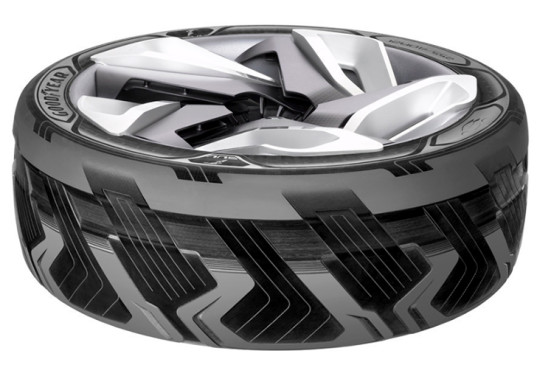Electric vehicles are jaw dropping and incredible, however as amazing as they are, one of their aspect that makes a sore selling point is their limited range.
To arrive at a solution to this end, in the past, engineers have tried to make them more efficient by inventing regenerative breaking. It involves capturing the energy which generally is as lost as heat and returning it to the battery, thereby increasing its range.
Apart from regenerative breaking, engineers have also explored other possibilities, such as generating energy from shock absorbers. Engineers at Goodyear are now exploring the possibility of squeezing more juice out of tires.
Like its competitors, Goodyear channels a portion of its available funds into research and development that lower the rolling resistance of tires. Less resistance translates into not only in higher fuel economy but also in the increase of the distance the vehicle can cover.
Efforts such as these have sparked an interest in Goodyear’s engineer to develop a tire that can actually generate electricity. The product they have developed is called BH-03.
The BH-03 captures energy in two ways:
1. It harnesses the advance of piezoelectric current – which is essentially an electric charge which builds up when piezoelectric materials are pressed or squeezed.
Xavier Fraipont, Director of Consumer Tire Technology says, that when tires spin and role, they are in a constant shape of deformity. Examples of piezoelectric materials would be quartz, a few kinds of salt varieties and some ceramics. Typically they are used in fuses for rocket-propelled grenades, cigarette lighters and pickups for electric guitars.
He goes on to say:
To arrive at a solution to this end, in the past, engineers have tried to make them more efficient by inventing regenerative breaking. It involves capturing the energy which generally is as lost as heat and returning it to the battery, thereby increasing its range.
Apart from regenerative breaking, engineers have also explored other possibilities, such as generating energy from shock absorbers. Engineers at Goodyear are now exploring the possibility of squeezing more juice out of tires.
Like its competitors, Goodyear channels a portion of its available funds into research and development that lower the rolling resistance of tires. Less resistance translates into not only in higher fuel economy but also in the increase of the distance the vehicle can cover.
Efforts such as these have sparked an interest in Goodyear’s engineer to develop a tire that can actually generate electricity. The product they have developed is called BH-03.
The BH-03 captures energy in two ways:
1. It harnesses the advance of piezoelectric current – which is essentially an electric charge which builds up when piezoelectric materials are pressed or squeezed.
Xavier Fraipont, Director of Consumer Tire Technology says, that when tires spin and role, they are in a constant shape of deformity. Examples of piezoelectric materials would be quartz, a few kinds of salt varieties and some ceramics. Typically they are used in fuses for rocket-propelled grenades, cigarette lighters and pickups for electric guitars.
He goes on to say:
“Now how can we associate them with other materials so that we can get the properties of piezoelectric together with some elasticity, which will be always required with a tire? …. [Well] That’s where we are at the moment.”
2. Through thermoelectricity which essentially converts the variation in temperature differences into electric charge. Irrespective of whether a tire is running on asphalt or whether it is sitting idle, it constantly generates heat. Goodyear’s engineers want to salvage this heat and put it to use through the use of thermoelectric materials, such as tin selenide, bismuth and telluride. Engineers hope to generate electricity from the difference between the coolest and the hottest of the rubber. The problem this has to be achieved without losing or sacrificing durability and the elasticity of rubber.
Once Goodyear’s engineer solve this part of the problem, their next likely focus will be to figure out where is the place to use it. One place that naturally comes in mind is placing power sensors inside tires to gauge air pressures and temperatures. These will be fed with other data to the car’s central computer so that it can improve the car’s performance.
In order to charge the battery, engineers could either makes use a hardwire connection which runs from the tire to the hub and then to the battery. Or they could simply transfer the energy through induction mechanisms.
Although these possibilities have now opened up, they are still only theoretical in nature, as engineers are yet to determine what materials are best put to use, their power efficiency, their practical usage and application into the tire and how much weight it would it add to the tire.
Although there are challenges that bring about further complications and intricacies at every turn, it is still uncertain whether the BH-03 will ever see hit the market. Even if and when it does, it’s likely to do so at least 10-15 years down the line and by then it could look way different from its current avatar.
What the BH-03 does however, it seed the idea in our collective consciousness is that tires can be made to generate electricity.
References:
http://www.engadget.com/2015/03/13/goodyear-energy-harvesting-tyres/
http://www.wired.com/2015/03/goodyear-trying-make-electricity-generating-tire/
http://www.goodyear.com/cfmx/web/corporate/media/news/story.cfm?a_id=1058
http://www.wired.com/2009/02/students-at-the/



















